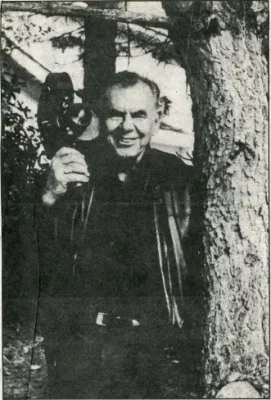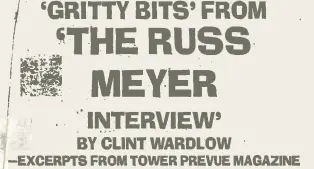‘Gritty Bits’ from ‘the Russ Meyer Interview’: June 1995
Archived
Russ Meyer is the guy who started it all. He is the undisputed king of the big breast movie. In 1959, he forked out $24,000 to make a 16mm movie about a man with the ability to see through women’s clothing. The Immoral Mr. Teas ranked in millions and the nudie movie was born.

Over the next 10 years, he cranked out several films with titles such as Mudhoney, Motorpsycho, Mondo Topless and the ever popular Faster Pussycat! Kill! Kill!
In the mid to late ’80s, the youth market, fueled by John Waters’ claim that Faster Pussycat was his favorite of all time, began to embrace the films of Meyers. Rock musicians cribbed his movie titles for their band names and his films began doing great revival house business.
Now the Meyer resurgence is in full swing—his soundtracks are available on CD and a new 35mm print of Faster Pussycat is doing big at the box office.
Even feminists who once loathed his movies are reevaluating his stuff. They seem to like the fact that his heroines are strong and sexually aggressive women played by, like, the likes of Kitten Hatividad, Erica Gavin and Edy Williams, while his men are dumb as dirt.
This interview was conducted over the phone while Meyer was resting at his desert home in California after a month on the road. Despite his claim that he hates “goddamn interviews” and he was sick of yacking after his road trip, Meyer proved to be a very easy person to chat with and seemed eager to talk about his movies.
Russ Meyer Interview
May 10, 1995
CW: Isn’t Faster Pussycat! Kill! Kill! much more popular now than when it first came out?
Meyer: Pussycat came out in ’67 or ’68 and it was not a success. It followed a picture called Motorpsycho, a movie about three tough guys. Motorpsycho was very successful. The reason I brought the change of plan, as it were, was because the Baptists were getting up in arms about nudity in theaters and drive-ins, things of that nature. So I made that one [Motorpsycho] and it worked very well. I made a lot of money on it. And then I got a wise idea and said I will do one with three bad girls. Pussycat was before its time. People didn’t know much about lesbianism, I guess. Certainly it wasn’t a common everyday word. It bombed! Pussycat was not a success.
CW: When Beyond the Valley of the Dolls showed in Utah back in 1970, I seem to remember the state brought some sort of obscenity charges against it. Yet there were long lines to see it every night. Do you remember anything about that?
Meyer: Well, Beyond the Valley of the Dolls was made through [20th Century] Fox. With a major studio, you have a lot more potency. They are not frightened like some other exhibitors might be. I know there was an occasional sort of thing like that. It was distributed through a major studio despite the fact that it had an X-rating. Now it is rated NC-17 which is one and the same [as an X], and it plays on HBO frequently. I can’t recall right off the bat that there were problems in Utah.
CW: Didn’t feminist groups once complain about your movies?
Meyer: They might have, which is good. It generates interest. But no more. They accept Meyer always having strong women who are pretty much in charge of things. The men are all cuckolds, you see. So right now there is not nearly enough opposition to it. In fact, if anything, it’s very positive.
CW: In Faster Pussycat, along with your other movies, you seem to imply a lot more violence than is on the screen through editing.
Meyer: Editing is the most important contribution anyone could make to a movie shot of a big pair of tits. At least in a Russ Meyer movie I should say.
CW: You cut a new print of Faster Pussycat. Do you plan to do that with any other films or are you too busy with your compilation film?
Meyer: I am going to bring some films out in their entirety, yes. It is a matter of getting around to it. I’ve got a very strong video business, a couple of videos, with two spectacular women that I did a very personal kind of thing. It’s very strong. It’s kind of a video that gets you through the night. You know what I’m saying, right?
CW: Yes.
Meyer: Anybody that doesn’t get there in that room and take his schlong out and whack it around then something is wrong with him. That’s what I say about gettin’ through the night. One of the actresses is Pandora Peaks. She is spectacular. You will find her in Playboy. The other one is Melissa Mounds. So you got a pretty good idea of what they are all about.
CW: Those names evoke certain images.
Meyer: They are very large. They extend beyond what you have seen here before.
CW: I read in Psychotronic Video that you used famous Playboy playmate June Wilkinson in an unaccredited role for The Immoral Mr. Teas.
Meyer: She was under contract to Seven Arts. She and I were good friends and I had done a lot of still photography with her. It was just a shot of her boobs that jutted out of something in the Teas movie. She said: “I can’t show my face or you’ll be in trouble and my ass will be in a sling.” So she put that much of her tits into it.
CW: You seem to be popular with a younger crowd. Two popular rock bands named themselves after titles of your movies, Faster Pussycat and Mudhoney.
Meyer: Yeah, Pussycat was with my blessing because they came to me, and they asked me to do a music video, which I did. The other guys, the Mudhoney bunch, never bothered to ask, but I’m pleased that they’re using it. It’s fine. They are a grungy bunch and it kind of fits in with a grungy movie. Seattle kind of gives birth to grungy musicians. How about the guy who shot himself?
CW: Kurt Cobain.
Meyer: Yes.
CW: Wasn’t Faster Pussycat your last black-and-white film?
Meyer: Yes, that was it. I didn’t use black and white for any artistic reasons—We didn’t have enough money to do it in color.
CW: A lot of people who made movies under the same conditions as you are now broke.
Meyer: I was successful. I had good management and things of that nature. I had a style and it worked. That’s all. Strictly.
Read more from SLUG Archives here:
Concert Review: February 1995
Straight Freak Ticket Interview w/ Love Battery
